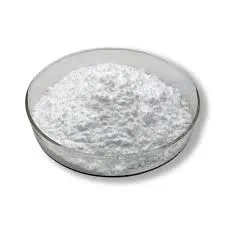
Okt . 13, 2024 10:57 Back to list
Exploring the Properties and Applications of Propyl Methyl Cellulose in Modern Industries
Understanding Propyl Methyl Cellulose Applications and Benefits
Propyl methyl cellulose (PMC) is a derivative of cellulose, a natural polymer found in the cell walls of plants. As a modified cellulose ether, PMC has gained significant attention in various industries due to its unique properties, making it a versatile ingredient in food, pharmaceuticals, construction, and cosmetics. This article aims to explore the composition, properties, applications, and benefits of propyl methyl cellulose.
Composition and Properties
Propyl methyl cellulose is synthesized through the chemical modification of cellulose. The process involves treating cellulose with propylene oxide and methyl chloride, creating a polymer that exhibits both hydrophilic and hydrophobic characteristics. The degree of substitution for methyl and propyl groups affects the solubility and viscosity of the polymer, allowing for adjustments based on specific applications.
PMC is typically a white to off-white powder that is odorless and tasteless. It is soluble in cold water, forming a clear solution, which is a significant advantage over other cellulose derivatives that may require heat for dissolution. The solution's viscosity can vary widely, providing manufacturers with the flexibility to choose an appropriate grade for their needs.
Applications
1. Food Industry In the food sector, PMC is widely used as a thickener, stabilizer, and emulsifier. Its ability to retain moisture makes it a popular choice in various food products, enhancing texture and mouthfeel. Additionally, PMC is used to create gluten-free bakery products, where it mimics the properties of gluten, improving dough elasticity and stability. By holding water, it also prolongs the shelf life of baked goods and contributes to freshness.
2. Pharmaceuticals PMC is extensively utilized in pharmaceutical formulations, particularly in controlled-release drug delivery systems. Its gel-forming ability allows for a gradual release of active pharmaceutical ingredients (APIs), ensuring prolonged therapeutic effects. Moreover, PMC can improve the bioavailability of poorly soluble drugs, enhancing their efficacy. Beyond drug formulations, it is used as a binder in tablets and as a coating agent to protect sensitive compounds from degradation.
3. Construction In building materials, PMC serves as a crucial additive in cement and mortar. Its water retention properties allow for better workability and adhesion, preventing cracking during curing. By enhancing the mechanical properties of cement, PMC contributes to the strength and durability of construction projects. Additionally, it acts as a controlling agent for the setting time, ensuring optimal performance of various construction materials.
propyl methyl cellulose

4. Cosmetics and Personal Care The cosmetic industry also benefits significantly from the use of propyl methyl cellulose. Its film-forming ability allows it to be incorporated into lotions, creams, and other personal care products to provide a smooth texture and enhance skin feel. Furthermore, PMC is used as a thickening agent in shampoos and conditioners, helping to achieve a desirable consistency and improve product stability.
Benefits
The inclusion of propyl methyl cellulose in products across these diverse industries offers a range of benefits
- Versatility Its unique properties enable customization for various applications, making it a crucial ingredient in many formulations.
- Safety and Non-toxicity As a cellulose derivative, PMC is considered safe for consumption and use in personal care products, meeting the necessary regulatory standards.
- Sustainability Originating from natural cellulose, PMC aligns with the growing demand for sustainable and plant-based ingredients.
- Improved Performance The use of PMC can enhance the texture, stability, and overall performance of products, improving consumer satisfaction.
Conclusion
Propyl methyl cellulose represents an essential component across multiple sectors due to its unique properties and versatility. From improving food texture and stability to enhancing drug delivery and building material performance, PMC plays a significant role in modern formulations. As industries continue to innovate and prioritize sustainability, the demand for cellulose derivatives like propyl methyl cellulose is likely to grow, affirming its place as a valuable ingredient in various applications. As consumers become more aware of ingredient safety and environmental impact, PMC stands out as a reliable and effective choice in both products and formulations.
-
Versatile Hpmc Uses in Different Industries
NewsJun.19,2025
-
Redispersible Powder's Role in Enhancing Durability of Construction Products
NewsJun.19,2025
-
Hydroxyethyl Cellulose Applications Driving Green Industrial Processes
NewsJun.19,2025
-
Exploring Different Redispersible Polymer Powder
NewsJun.19,2025
-
Choosing the Right Mortar Bonding Agent
NewsJun.19,2025
-
Applications and Significance of China Hpmc in Modern Industries
NewsJun.19,2025







